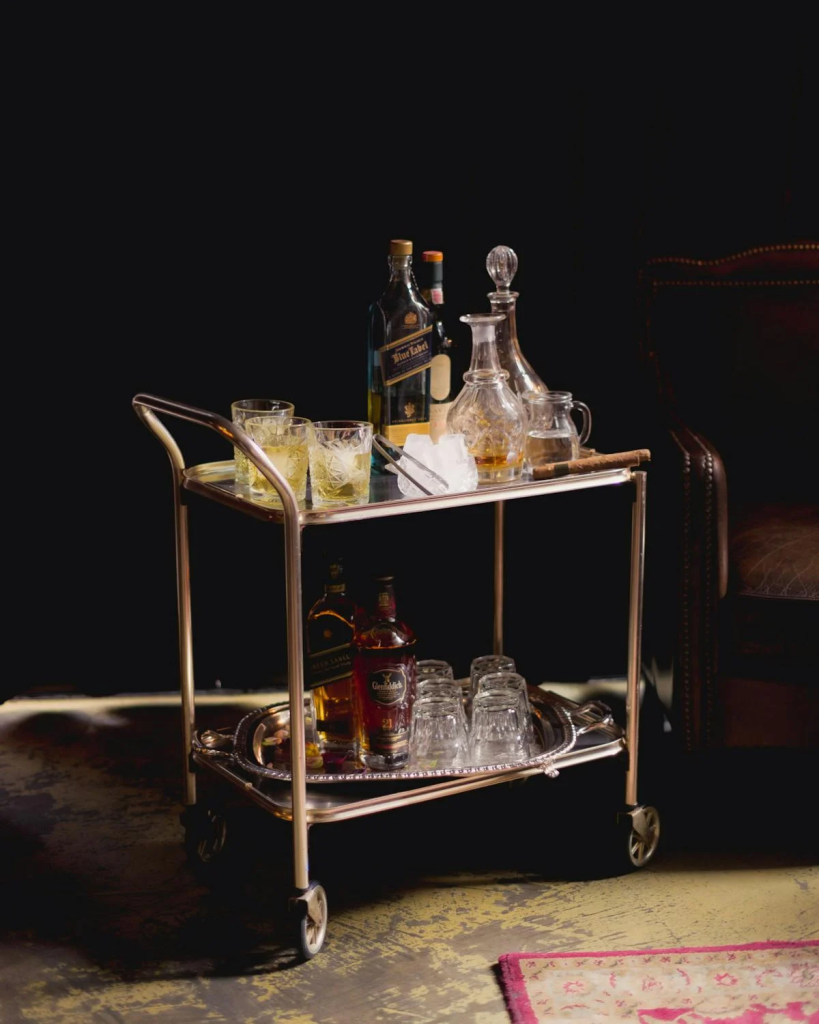Whisky is popular all over the world due to its complex character and rich flavour profile, and it has a long and illustrious history. Whisky has become an indispensable component of many pubs and lounges around the globe, whether enjoyed plain, with ice or blended into a traditional cocktail. However, there are a handful of brands that always seem to be the most popular among the many options.

The best-selling whiskies in bars showcase a range of styles, from the classic smokiness of bourbon to the modern sophistication of single malts. Discover the whisky that has won over whisky connoisseurs worldwide. We’ll take a closer look at what makes these drinks special and why they’ve been popular for so long.
What Is The Most Popular Whisky In Bars?
Depending on location and business type, the most popular whisky brands in bars might vary. However, there are a few brands that are regularly found everywhere. Names like Maker’s Mark, Jack Daniel’s, and Jim Beam are household names in the United States. Popular Scotch whisky brands in Scotland include Glenfiddich and Glenlivet.
Where To Find The Whisky Bar In Melbourne?
Melbourne is known for its vibrant bar scene, and there are several great spots to find excellent whisky. Here are a few notable whisky bar melbourne you might want to check out:
- Whisky & Alement – Located on Russell Street, this bar is renowned for its extensive selection of whiskies from around the world. The knowledgeable staff can help you find the perfect pour.
- The Smith – Situated on Smith Street in Fitzroy, this bar offers a well-curated whisky list along with a cozy atmosphere and great food.
- The Dramatic – Found on Little Collins Street, The Dramatic features a wide range of whiskies and a relaxed, stylish setting.
- The Whisky Lounge – On High Street in Northcote, this spot provides a comfortable setting to enjoy a diverse selection of whiskies.
- The Noble Experiment – Located on Little Bourke Street, this bar has a focus on craft cocktails but also offers a solid range of whiskies.
These bars are well-regarded for their whisky selections and ambience.
Is Whisky Alcohol Or Liquor?
Whisky is both an alcohol and a type of liquor.
- Alcohol: This term generally refers to any beverage containing ethanol, the intoxicating component found in alcoholic drinks. Whisky, as an alcoholic beverage, contains ethanol.
- Liquor: This term specifically refers to distilled alcoholic beverages, which are typically higher in alcohol content compared to fermented drinks like beer and wine. Whisky is classified as a liquor because it is made through the distillation of fermented grain mash.
So, whisky fits into both categories: it’s an alcoholic beverage and a distilled liquor.
How Much Alcohol Is In Whisky?
The alcohol content in whisky typically ranges between 40% and 50% alcohol by volume (ABV). This percentage can vary depending on the type of whisky and its production process.
- Standard Whiskys: Most commercial whiskys, including bourbons, scotches, and ryes, are usually bottled at around 40-43% ABV.
- Cask Strength Whisky: These are bottled at a higher ABV, often ranging from 50% to 60% or even higher, as they are not diluted before bottling.
Always check the label for the exact ABV of a specific bottle, as it will give you the precise alcohol content.
How To Choose A Whisky?
Choosing a whisky can be a delightful experience, but it might feel overwhelming with so many options available. Here’s a guide to help you select a whisky that suits your taste:
Know Your Preferences
- Flavour Profile: Do you prefer smoky, peaty flavours (common in Scotch), sweet and rich notes (often found in bourbon), or something more balanced?
- Type of Whisky: Consider whether you want bourbon, Scotch, Irish whisky, rye, or another type. Each has unique characteristics.
Consider the Age
- Older whisky can be more complex and smooth, but age doesn’t always equate to quality. The best age depends on personal taste.
Check the ABV (Alcohol By Volume)
- Higher ABV whisky (like cask strength) is more potent and intense. Lower ABV whisky is generally smoother and more approachable.
Read Reviews and Ratings
- Look for reviews from critics and enthusiasts to get an idea of what to expect from a particular bottle.
Explore Different Brands
- Try a few from different brands to see which ones you like best. Well-known brands often have a range of expressions that can introduce you to various styles.
Visit Whisky Bars or Tastings
- If possible, visit bars with extensive whisky selections or attend whisky tastings to sample different options and find what appeals to you.
Consider the Price
- Whisky ranges in price from budget-friendly to premium. Determine your budget and find a quality option within that range.
Ask for Recommendations
- Don’t hesitate to ask for advice from knowledgeable staff at liquor stores or bars. They can offer personalized suggestions based on your tastes.
Exploring whisky can be an enjoyable journey of discovery, so take your time and savour the process!
What Determines A Good Whisky?
Several factors contribute to what makes a whisky “good.” Here’s a breakdown of key elements to consider:
Flavour Profile
- Balance: A well-crafted whisky should have a harmonious balance of flavours, with no single note overpowering the others. Common flavours include vanilla, caramel, oak, fruit, spice, and smoke.
- Complexity: Good whisky often has multiple layers of flavour that evolve, offering a rich and engaging tasting experience.
Smoothness
- Quality whisky should be smooth and enjoyable to sip. Harshness or a burning sensation may indicate a lower-quality product or one that isn’t well-suited to your taste.
Aroma
- The nose of a whisky can reveal a lot about its quality. A good whisky will have an inviting and complex aroma that hints at its flavour profile.
Age and Maturation
- Age can influence whisky’s flavour, but it’s not the sole determinant of quality. Proper maturation in well-chosen barrels enhances complexity and smoothness. However, some whiskies are excellent at a young age.
Craftsmanship
- The skill of the distiller, the quality of ingredients, and the production methods all play a role in the final product. Attention to detail in each stage of production can significantly impact the quality of the whisky.
Finish
- The finish is the lingering taste left on the palate after swallowing. A good whisky often has a pleasant, lingering finish that complements its overall flavour profile.
Consistency
- High-quality whiskies are consistent from bottle to bottle, ensuring a reliable and enjoyable experience each time you drink it.
Reputation and Awards
- While not the only measure of quality, recognition from industry awards and positive reviews from critics can be indicators of a well-regarded whisky.
- Personal Preference
- What makes a whisky good is subjective and based on personal taste. A whisky that is highly regarded by experts may not necessarily be the one you enjoy the most.
A good whisky aligns with your personal preferences and provides a satisfying experience, whether you’re sipping it neat, on the rocks, or in a cocktail.
Conclusion
Several factors contribute to a whisky’s quality, including its age, fragrance, smoothness, and flavour profile. While these factors do serve as a starting point, your unique preferences will determine which whisky is the finest. Whether you’re looking for a whisky with complexity, balance, or a certain style, there are several to choose from, and it’s possible to discover one that suits your tastes by reading reviews and looking at awards.
Having fun is just as important as being technically proficient when it comes to the process of learning about and enjoying whisky. Cheers to discovering the ideal beverage for you!
